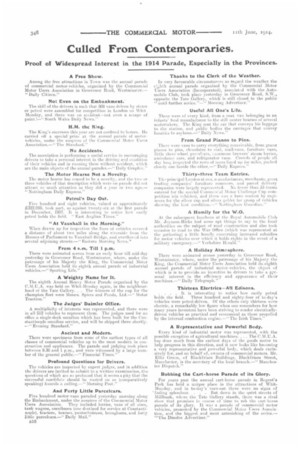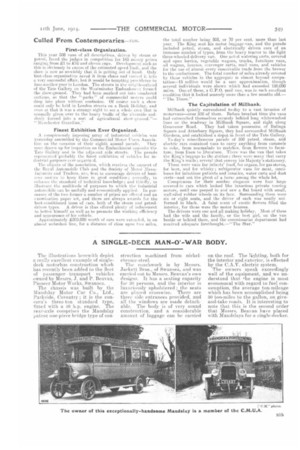Culled From Contemporaries.
Page 4

Page 5

If you've noticed an error in this article please click here to report it so we can fix it.
Proof of Widespread Interest in the 1914 Parade, Especially in the Provinces.
A Free Show.
Among the free attractions in Town was the annual parade of commercial motor-vehicles, organized by the Commercial Motor Users Association in Grosvenor Road, Westminster.—
Daily Citisen."
Not Even on the Embankment.'
The shill of the drivers is such that 508 vans driven by steam or petrol were assembled for competition in London on Whit Monday, and there was no accident—nut even a scrape of paint !—" South Wales Daily News."
thc King.
The King's successes this year are nut confined to horses. He carried oft a special prize at the annual parade of motorvehicles, under the auspices of the Commercial Motor Users Association.—" 'The Standard."
No Accidents.
The association is performing a useful service in encouraging drivers to take a personal interest in the driving and conditioe of their vehicles and in running them without accident, which are the main objects of the annual parades.—" Daily Graphic."
The Motor Hearse Not a Novelty.
The motor hearse has ceased to be a novelty, and the two or three vehicles of that description which were on parade did not attract so much attention as they did a year or two ago.— " Nottiugham Daily Express."
Petrol's Day Out.
Five hundred and eight vehicles, valued at approximately £322,000, took part, as against twenty-six at the first parade in December, 1907. It is interesting to notice how easily petrol holds the field. " East Anglian Times."
"At Vauxhall in the morning."
When drawn up for inspection the lines of vehicles covertd a distance of about two miles along the riverside from the Houses of Parliament to Vauxhall Bridge, and overflowed into several adjoining streets.—" Eastern Morning News."
From 4 a.m. Till I p.m.
There were animated scenes from an early hour till mid-day yesterday in Grosvenor Road, Westminster, where, under the patronage of his Majesty the King, the Commercial Motor Users Association held its eighth annual parade of industrial vehicles.—" Sporting Life."
A Weighty Name for It.
The eighth Annual Heavy Motor Parade organized by the C.M.U.A. was held on Whit-Monday again, in the neighbourhood of the Tate Gallery. . . The winners of the cup for the champion fleet were Messrs. Spiel's and Ponds, Ltd.—" Motor Traction."
The Judges Daimler Office.
A multiplicity of interests was represented, and there were in all 512 vehicles to represent them. The judges used for an office a single-deck omnibus which has been built for the Constantinople omnibus service, and will be shipped there shortly. —"Evening Standard."
Ancient and Modern.
There were specimens from some of the earliest types of all classes of commercial vehicles up to the most modern in construction and appliances. The parade and judging took place between 9.50 and 1 p.m., and were witnessed by a large number of the general public.—" Financial Times."
Profound Questions for Drivers.
The vehicles are inspected by expert judges, and in addition the drivers are invited to submit to a. written examination, the questions of which are so profound that it seems 4 pity that the successful candidate should be wasted on so (comparatively speaking) humniusa calling.—" Morning Post."
And Forty Little Parcelcars.
Five hundred motor-vans paraded yesterday morning along the Embankment, under the auspices of the Commercial Motor Users Association. They included lorries, vans of all sizes, tank wagons, omnibuses (ono destined fur service at Constantinople), tractors, hearses, pantechnicons, broughams, and forty little parcelcars.—" Daily Mail."
1110
Thanks to the Clerk of the Weather.
In very favourable circumstances as regard the weather the annual parade organized by the Commercial Motor Users Association (Incorporated), associated with the Automobile Club, took place yesterday in Grosvenor Road, S.W., opposite the Tate Gallery, which is still closed to the public " until further notice."—" Morning Advertiser."
Useful All One's Life.
These were of every, kind, from a neat van belonging to an infants' food manufacturer to the still neater hearses of several undertakers. The King sent the car that conveys his luggage to the station, and public bodies the carriages that convey lunatics to asylums.—" Daily News."
From Grand Pianos to Pins.
There were vans to carry everything conceivable, from granct pianos to pins, chocolates to :mai, mail-vans, furniture vans, little three-wheel pareslears, eeormous brewers' steam lorries, ambulance cars, and refrigerator vans. Crowds of people alt day long inspected the rows of ewes lincd up for miles, packed closely one beside the ether.—" Daily Express."
Thirty-three Team Entries.
`111. principal London stsru a. isanufacturcrs, merchants, great trading companies' furniture removers, and parcel delivery companies were largely represented. No fewer than 33 teams entered for the special Cummere:al Motor Challenge Cup competition (six vehicles), and there was a keen contest by engineers for the silver cup and silver goblet for grump of vehicles showing the btat condition.-Nottiogf000 Guardian."
A Homily for the W.O.
At the subsequent luncheon at the Rnyal Automobile Club Mr. Jovuson-Hicks had some apt things to say to the local authorities on the subject of road construction and also took occasion to read to the War Office (which was represented at the gathering) a little homily concerning increased subsidies for motor vehicles over which it holds rights in the event of a ,military emergency.—" Yorkshire Herald."
A Holiday Atmosphere.
There were animated scenes yesterday in Grosvenor Road, Westminster, where, under the patronage of his Majesty the King, the Commercial Motor Users Association held its eighth annual parade of industrial motor-vehicles, the object of which is is to provide an incentive to drivers to take a personal interest in the efficiency and appearance of -their machines.—" Daily Telegraph."
Thirteen Electrics—AU Edisons.
. . . It is interesting to notice how easily petrol
holds the field. Three hundred and eighty-loin' of to-day's
vehicles were petrol-driven. Of the others only thirteen were electric, a remarkably low figure wheuu one remembers for how many years inventors have been striving to render electricallydriven vehicles as practical and economical as those propelled by the internal combustion engine.—" The Irish Times."
A Representative and Powerful Body.
Every kind of industrial motor was represented, with the possible exception of agricultural machines.... The C.ALU.A. ha$ done much from the earliest days of the goods motor to help progress in this direction, and it now looks like becoming a very representative and powerful body, which deals exclusively for, and on behalf of, owners of commercial motors. Mr. Ellis Gresn, of Blasskfriars Buildings, Blackfriars Street, Manchester, is the secretary of the local branch.—" Manshester Dispatch,"
Robbing the Cart-horse Parade of its Glory.
For years past the annual cart-horse parade in Regent's Park has held a unique place iLi the attractions of WhitMonday, and in to-day's turn-out there were no signs of
' fading splendour„ . But down in the quiet streets of Millbastk, where the Tate Gallery stands, there was a rival show that promises in issurse of time to rob the cart-horse parade of its glory. It was a parade of tommercial motor vehicles, promoted by the Commercial Motor Users Association, and the biggest and most. astonishing of the series.— 'The Dundee Advertiser." First-class Organization.
This year 508 vans of all descriptions, driven by steam or petrol, 'faced the judges in competition for 145 money prizes ranging from Ll to £10 and eleven cups. Development such as this is obviously in excess of the estimated speed limit, and the show is now so unwieldy that it is getting out of hand. Only first-class organization saved it from chaos and torinid it into a very successful affair' but it would be tempting providence pting pr to face another 'year in London. The streets in the neighbourhood of the Tate OraHay on the Westminster Embankment formed the show-ground. They had been marked out into monbered sections, so that the "parks " of commercial niotrs could drop into plaee. without confusion. Of course such a show could only be held in London streets on a. Bank holiday, and even at that it was a strange sight to see a whole aria that is normally given over to the heavy traffic of the riverside suddenly turned into a sort of agricultural show-rorind."— " 31z,chliester Guardian."
Finest Exhibition Ever Organized.
A conspicuously imposing array of industrial vOlkieS was yesterday assembled by the Commercial Motor Users Association on the occasion of their eighth annual parade. They were drawn up for inspection on the Embankment opposite the Tate Gallery and in the adjaLtent side streets. The parade reprm:lited probably the finest exhibition of vehicles for industrial. pnrposes ever organiz:.d.
The ohjiceis of the association, which receives the support of the Royal Automobile Club and the Society of :Motor ..11anufact titers and Traders, fir, first to encourage drivers of business motors to keep them in good condition ; secondly, to enflame tine standard of technical knowledge ; and thirdly, to illustrate the multitude of purposes to which, the industrial automobile can be usefully and economically applied. In pursuance of the two former a number of prizes an' offered and an examination paper set, and there are always awards for the best-conditioned team of cars, both_ of the steam and petrol
driven types. A driver is thus offered plenty of inducement to better himself as well as to promote the working efficiency and appearance of his vehicle.
Approximately £.3c0,000 worth of cars were extended, in an almost unbroken line, for a distance of close upon tv,u miles,
the total number being 508, or 30 per cent. more than last ;year. The King sent his motor luggage-van, and the parade included petrol, steam, and electrically driven cars of an immense number of types, from the heavy tractor to the light three-wheeled delivery van. One noted watering carts, covered and open lorries, vegetable wagons, trucks, furniture vans, oil wagons, hearses, scavenger carts, mail vans, and vehicles for the use of almost. every conceivable trade from the brewer to the confectioner. The total number of miles already covered by the vehicles in the aggregate is almost boyon computation-15 million would be, a sate approximation, though several individuals were shown which had exceeded 150,000 miles. One.of these, a G.P.O. mail van, was in such excellent condition that it looked scarcely more than a few months old,— " The Times," The Ca?itulation of Millba.nk.
Millbank quietly surrendered to-day to a vast invasion of motorvans—over 500 of them. Before breafast time the vans bad entrenched themselves securely behind long whitewashed lines on the roadway in Millbank Square, and right along Grosvenor Road. They had taken possession of Bulinga Square and Atterbury Square, they had surrounded Millbank Gardens, and established a depot, in front of the Tate Gallery. miscellaneous parade of 508 petrol, steam, and electric cars contained vans to carry anything from caramels to coke, from marmalade to matches, from flowers to furniture, from linen to literature. There was the van that takes the King's luggage to the station ; there were many that carry the King's mails; several that convey his Majesty's stationery. 'There wera vans for infants' food, for organs, for gas stoves, far beer, and for whisky ; refrigerator vans for meat, omnibuses for infections patients and lunatics, water carts and dust carts—and not the ghost of a horse. among the whole lot.
Conspicuous for their sombre elegance were four large covered-in cars which looked like luxurious private touring motors, until one peeped in and saw a flat board with small, weli.oiled rubber wheels on its face. Surrounding them were six or eight seats, and the driver of each was neatly nniformed in black. A faint, scent. of exotic flowers filled the interior, for these were the motor hearses.
The drivers were one and all making holiday. Most of them had the wife and the family, or the best girl, on the van beside or behind them, and the commissariat department had received adequate forethought.—" The Star."

























